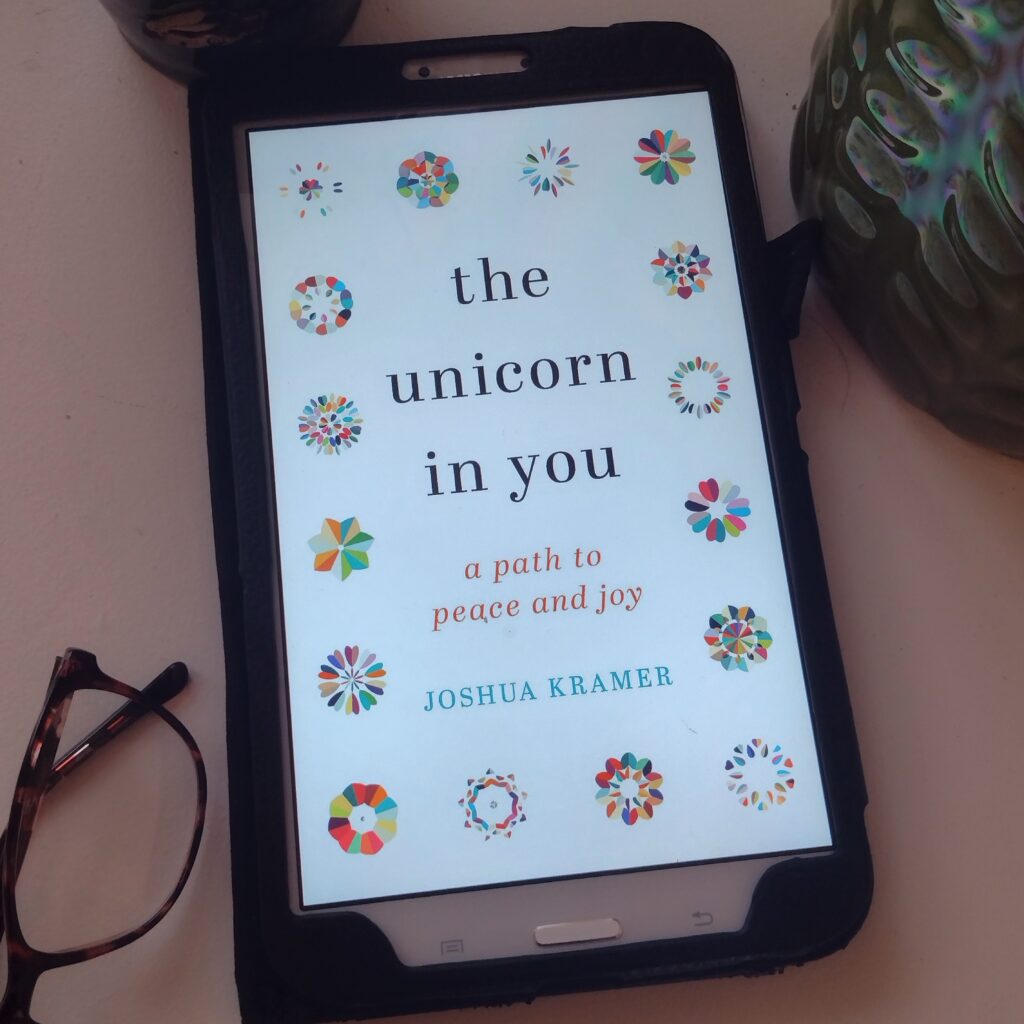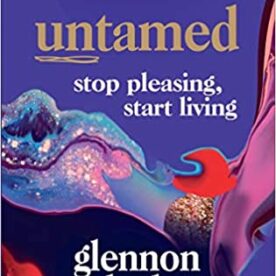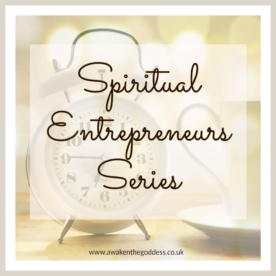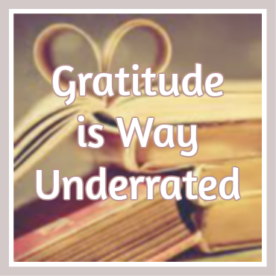I have to admit, I probably wouldn’t have picked this book up if it hadn’t been suggested by a member of our Goddess Book Group as our next read. The title and front cover just didn’t appeal, I didn’t trust that it would have anything new or useful to impart. However, I’m very glad I read it.

If you want a quick and easy read that will remind you of some basic life principles then this is the book for you. If like me, you’ve read a lot of books in the ‘self improvement’ genre, none of the stuff in The Unicorn in You will be new to you. But it’s a pleasant reminder of how to live in a more wholesome state of being that makes you feel good and improves the world around you at the same time.
Joshua lays out 5 simple but powerful principles for living a life of peace and joy. He explains how practicing Kindness, Gratitude, Integrity, Humility and Acceptance brings peace and joy. He includes simple ways of practicing each principle – my favourite was the suggestion for feeling gratitude through being in the present moment:
‘Consider this moment to be the only moment that matters. How do you do that? Stop. Look around. Take a deep breath. Hold a smile. Be still.’
I can tell you, it really works for me.
The book is kind of elegant in it’s simplicity. Filled with well chosen stories and anecdotes – many of which I’ve read or heard before in other books or talks, but a nice reminder none the less.
‘When you make the “repetition of kindness” a central part of your lifestyle, you wind up spending much more time living in that happier and healthier place.’
Summary and Notes
Below are my rough notes on the book – it’s not intended as a well crafted piece of writing, just my personal summary and reminder of what I took from the book.
Introduction
Explains how he came to write the book and an overview of the 5 principles
1. Kindness
“Kindness is the language which the deaf can hear and the blind can see.” —Mark Twain
Overview: We can incorporate kindness as a way of being by actively choosing acts of kindness on a daily basis until it becomes second nature to us. Compassion is a core part of the ability to be kind. ‘If we want to help someone, we must be able to see things from their perspective so we can understand what they will view as kindness in the moment’. Kindness can change lives and it spreads – reminds me of pay it forward.
Tells the story of a professor who had her class write their names on balloons and released the balloons into a room. The students were given two minutes to find the balloon with their name on. They weren’t able to find their balloons in the time allowed. She sent them back out and told them that this time they should just grab any balloon and then hand it to the person who it belonged to. Everyone got their balloon back within the 2 minutes allocated
The Path of Kindness
Kindness has health benefits – kindness has been linked to a decrease in blood pressure and reduced stress levels. The improvement in personal relationships and connection fostered through kindness leads to increased sense of wellbeing and belonging.
Kindness gives pleasure – kindness can lead to a ‘helpers high’ – basically being kind and helping people releases feel good chemicals in the brain that enhances our mental health.
Kindness lightens your mind – by helping others you get out of your own head and focus on others and the world around you. This can help to alleviate worry, anxiety etc because you’re not just thinking about yourself and your issues all the time. My caveat here is that you want to focus on the things/people around you on which you can actually have an impact. Worrying about a war torn country and a war you can’t personally end can contribute to mental anguish rather than alleviate it. Focus on things you can do – fund raise for the victims, speak up for refugees when you hear people complaining etc.
Developing Compassion, which allows kindness
Release your own judgements – release the need/habit of judging people and they behaviour. Comparing other people against yourself, putting them or yourself in a mental pecking order can lead to negative emotions in the form of comparison envy which robs joy and motivation or you can put yourself above others and look down on people, equally damaging. Release the need to make judgements about people ‘worth, values or qualities’ – you don’t know their situation or what led them to be where they are today.
Practice ‘pro-social’ behaviour – this is the opposite of anti social behaviour – so if anti social behaviour creates unpleasantness for others, a person being pro-social would actively seek ways of making other people’s lives better. Its an outward looking, selflessness that takes you out of yourself and contributes to the greater good.
Allow for emotional vulnerability – being vulnerable can be scary because it opens you up to being hurt but letting your guard down and allowing people to get close to you creates a sense of connection which allows you to tap into compassion for other more easily. Be honest with yourself about how you feel (e.g. are you scared, lacking confidence, frozen in indecision) and this will allow you to understand that other may be feeling similar things. Having this openness and awareness of other peoples vulnerability and/or armour makes it easier to be vulnerable yourself.
2. Gratitude
“Gratitude is a divine emotion: it fills the heart, but not to bursting; it warms it, but not to fever.” —Charlotte Brontë
Overview: Gratitude comes through awareness of what you already have to be thankful for. It leads to focussing on the things you have rather than the things you lack. Cultivation of a grateful attitude leads to an overall optimistic out look on life.
The chapter begins with the story of Midas, which you may remember from childhood where Midas, being greedy, wished that everything he touches turns to gold. But when literally everything he touches including food and family members turns to gold, he realises his folly and the outcome of his greed. “If only I’d appreciated what I already had,” he said, “instead of lusting after what I did not have. I no longer want this power! It has robbed me of all joy and taken the things that mattered most in my life.”
Being aware of what you have is the first step in feeling gratitude.
Choosing Joy: Tells the story of a man who was on death row, often in solitary confinement, for 28 years for a crime he didn’t commit. He didn’t become angry or bitter, instead befriending the guards, who all believed he should be released. When he was finally released after an appeal, he valued his freedom so greatly, something many of us take for granted everyday. He said that no one can come and take his joy away because he chooses to feel joy.
The Path of Gratitude and how it leads to peace and joy
Gratitude = Positivity: by seeking what you are grateful for you look at the positives. Attention goes to the positive things in life more often.
Practicing gratitude reinforces our belief that there are positive things in our life because we focus on what we have not what we don’t have.
Gratitude simplifies – by helping us focus on what is important in any given situation (by looking for the thing to be grateful for) everything is simplified and we are able to be in the present. I feel this section could have been explained a bit better, in more detail.
Developing awareness, which enables gratitude
Be in the present – this allows you to avoid regret about the past and anxiety about the future. Being in the present allows you to live life with more joy and fullness. How do you be in the present? ‘Consider this moment to be the only moment that matters. How do you do that? Stop. Look around. Take a deep breath. Hold a smile. Be still.’
Things are happening for you, not to you – if you take each situation as a gift that is here to give you something, teach you something then you can see the value in every situation and not fall short of victim mentality ‘What is the good that the universe is handing to you in every situation?’ Choose to be grateful for the obstacles, the challenges as well as the gifts – because it’s all a gift and seeing it that way will lead to peace and joy.
Practice – find a routine that you can fit into your day that allows you to practice gratitude – whatever it is, writing a list in a notebook everyday, a gratitude prayer – whatever, just do it because its only by practicing it that you can embody it
Gratitude is the easiest of the 5 principles to achieve and cultivate – you just open your eyes and look for something to be grateful for. The more you do this, the more abundance you’ll see.
3. Integrity
“Integrity has no need of rules.” —Albert Camus
Overview: Decency leads to integrity, you have a set of ethical a moral codes that guide you in your life. Integrity allows you to live a peaceful life because you feel good about your decisions and your conduct. People can rely on you and you can rely on yourself.
Tells the story of a father and son fishing on a lake, they catch a huge fish, the biggest ever, but it’s a bass and bass fishing season doesn’t open for another 2 hours. The son wants to keep the fish because no one is around and no one will know. But the father insists on throwing the fish back because “we’ll know. Doing the right thing is not just about other people,” he said. “It’s about us.”. The son did as he was instructed but never caught another fish of that size again in his life. However he did often remember the lesson of integrity that he learnt from his father that day
Decency is the ‘fuel that drives integrity’
Decent people have a moral code that they live by. They can be relied upon to self regulate.
Integrity gives people gravitas and trustworthiness
People with integrity do what they say they’ll do, they can be relied upon
‘Integrity that elicits decency creates the nucleus for who we are at our core. When it counts—and when it doesn’t—who are you? But, of course, it always counts’.
The Path of Integrity and how it leads us to peace and joy
Integrity = solidity – having a moral code that you live by gives you the confidence and peace of mind to know that you make decisions that feel right – even if you are criticised for them. You have a strong foundation for being and interacting in the world. You are free to live with ease, without self judgement, guilt, cognitive dissonance or doubt – this contributes to peace and joy.
Integrity become default – you can’t buy integrity. Integrity allows you to make decisions from a moral and ethical standpoint, which removes any grey or fuzzy areas from decision making. If you are acting from integrity, a decision will feel good and you won’t feel the need to rationalize what you’re doing
Integrity is a soft pillow – allowing you peace because you can sleep well at night with a clear conscience
The Way to Decency, which fuels integrity
Define values – figure out what you think is right and wrong, these are the values that you will live by, not the ones that you will impose on others
Take Responsibility – take responsibility for your actions and be honest with yourself. Check in to see whether you are living by your values. Do what you say you’ll do – this will earn the respect of others and yourself
Keep the right company – surround yourself with other people who have integrity, you become like those you spend the most time with
4. Humility
“Humility is not thinking less of yourself; it’s thinking of yourself less.” —C. S. Lewis
Overview: Being humble allows you to realise that you are just a small spec in a vast universe, it lets you pay attention to others in a way that constant self absorption doesn’t. Humility comes from a sense of grounded self confidence in who you are and what you do, it is not a result of insecurity or lack of self worth.
Tells a couple of stories about ‘important’ people doing menial things e.g. a president repairing a wall that one of their horses damaged and someone else making coffee for a friend who had lost a loved one. They were able to do this due to their humility, they didn’t have an overinflated sense of who they were, so doing tasks some might consider ‘beneath them’ just didn’t even occur to these people.
The Path of Humility
Humility eases weight of self importance – letting go of an inflated sense of self or inflated ego frees you from being trapped by your own privilege. We let go of pride and can realised that we aren’t perfect. ‘Humility allows for more realistic, reasonable expectations, which promotes a spirit that is light and free.’
Humility soothes the soul – having humility is the backbone of all the other principles. Being humble eradicates your self preoccupation and allows you to see people and situations as they are in the grand scheme. In the grand scheme of things everyone is equal – this allows you to tap into kindness and gratitude. “The universe is not all about me,” ‘Our hardships and frustrations are no longer viewed as universal injustices; it can become soothing to be mindful of this truth’
Humility re-centres our purpose – humility gets rid of the internal, self serving chatter and helps us see that it doesn’t matter if everything doesn’t go our way, we are just one person. Things might be going someone else’s way today – they deserve it too. Gives you a sense of what really matters.
The Way to a Humble Perspective
Cultivate awe – having a sense of awe or wonderment in the world and people around us allows us to feel less of a burden to impress ourselves or be in awe of ourselves. Having a sense of curiosity in other people, situations, the world around you shifts your focus and opens you up to the beauty and diversity around you everywhere. You can’t be absorbed with yourself when the whole world is fascinating to you.
Be situationally aware – notice what’s going on around you, focus on the subtle and not so subtle signals and signs presenting in any given situation and space. Paying attention to the external keeps your focus off your own internal self importance. What messages is the world sending you about the person, thing or situation in front of you? Shows emotional intelligence to be able to pick up on the cues and needs of others. Improves senses, perception and decision making
Listen Up – knowing that we don’t know everything allows us to listen and learn from others, which leads to growth and even enlightenment. Listen with intent, not because you are preparing an answer or waiting until it’s your turn to speak
Really funny story about Einstein giving a talk about some obscure niche topic. People found out through word of mouth that the great Einstein was giving a talk so the audience was overflowing. Einstein said, “I never realized that in America there was so much interest in tensor analysis.”
5. Acceptance
‘in the end, what matters most is how well you lived, how well you loved, and how well you learned to let go’
Overview: We have a choice in how we react to things, we can accept them or we can struggle against them. Struggle leads to frustration, anger, sadness and so on – which is the opposite of peace and joy. If we can accept a situation or something someone has done and also accept our part in it, we accept what is. This isn’t always easy but accepting our part in a situation leads to growth – we are the only ones we can control. Flexibility is crucial in acceptance – the ability to adapt to change and deal with potentially undesirable situations. This ability is a sign of ‘secure and strong’ mental health. This principle requires effort – it can be hard to accept someone else’s damaging behaviour, especially if it causes harm to you. However it is important to realise that accepting it doesn’t mean you condone it, or you are a doormat and allow it to happen again and again. Instead it means you let go of the control that negative emotions of anger, resentment etc can have over you. You transcend their bad deeds through acceptance that it happened and knowledge that you have the choice and ability to move past it, even learn from it.
Tells a great story about a Native American grandfather who tells his grandson that he has two wolves inside him who are fighting. One wolf is angry, violent and vengeful and the other is loving and compassionate. The grandson asks which wolf will win and that grandfather replies ‘whichever one I feed’
The Path of Acceptance
Acceptance grounds you in what is – by truly accepting things as they are we can see a situation for what it is. We have a realistic view and can make sound judgements about our options in dealing with a situation. We see and acknowledge our own contribution to a situation rather than living in blame or denial. We take personal responsibility, which is empowering and grounding. ’Being grounded in what is activates resilience, which is the capacity to both accept challenges and absorb them. In learning to accept circumstances rather than trying to dismiss them, we create a path forward for an even greater strength.’
Acceptance helps us let go – acceptance allows us to let go of the belief and burden that we can control every situation and the direction our life takes. When we let go, we are able to find a peace and joy that is not attached to our ability to control and shape outside forces. When we let go of the need to control, we can let go of fear and realise that we can handle whatever life throws at us. We release the burden of control.
Acceptance allows realistic expectations – expecting things that will never happen is extremely frustrating, acceptance allows us to focus on things that are realistic and achievable. The next part of the chapter goes on to say ‘This doesn’t mean we shouldn’t continue to dream big, but it does free us from the burden of expecting to receive what we may never have.’ I’m not sure that I agree with this. Surely you need to believe in a dream in order to achieve it? Being ‘relieved of the burden’ of expecting it inevitably means you don’t believe it will happen. Then it’s just a pipe dream. What is more frustrating than that? I would prefer to fully expect my big dreams to happen, because I truly believe this is the only way that they will.
The Way to Flexibility, which allows for acceptance
Feel it first – before you can truly accept something, you need to acknowledge how you really feel about it. Allow your feelings and get to the root of why you feel that way. Its the why that allows you to come to terms with the reality of ‘what is’ and then let go.
Eliminate ego – Looking at your own significance in the grand scheme of things can help to eliminate ego. Humility and acceptance go hand in hand because an inflated sense of self importance make difficult situations harder to accept. By eliminating ego you can assess situations as an outsider without an agenda
Find the positive to make peace – much like gratitude, we can search for the positive in any situation. ‘By honestly assessing the situation and finding something positive to take from it, you can now make peace with it.’ We look at a situation objectively and see what we can learn from it – even if that’s the only positive. We are able to bend not break – leading to growth and (again) enlightenment.
Afterword
There’s a decent end chapter that sums up and gives extra advise on how to implement the principles but I’ve not made any notes on this – yet.







Leave a Reply